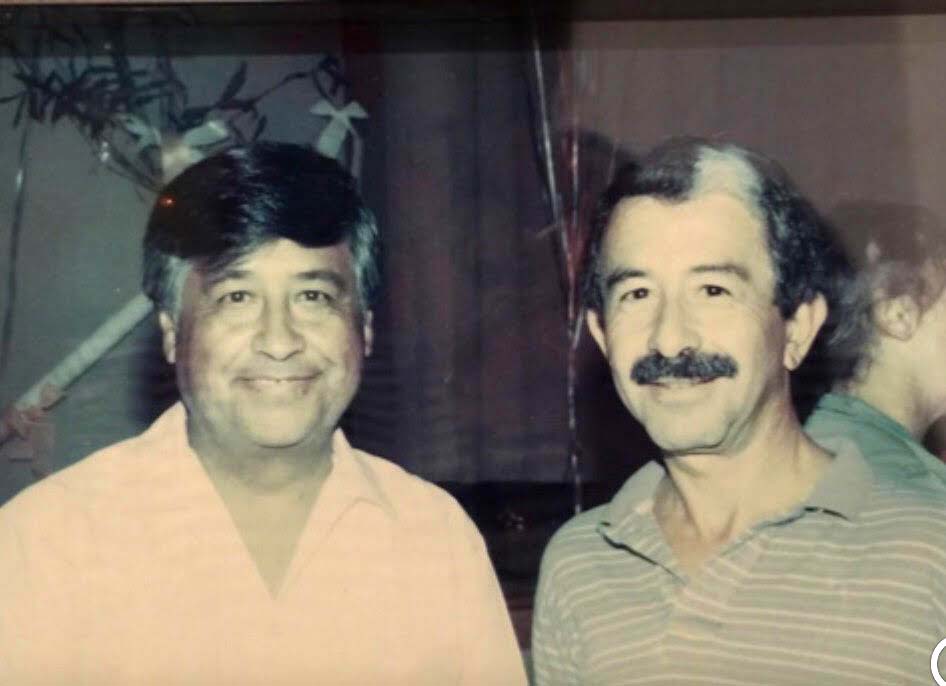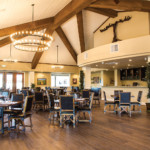REGION — One of the most influential labor leaders and civil rights activists in modern history stood in front of an audience at the Rancho Santa Fe Garden Club on Dec. 16.
Dolores Huerta, who co-founded the powerful United Farm Workers union and worked side-by-side with Cesar Chavez, was there not to speak about the movement, but about a white-haired Leucadia man whose quiet works proved critical to the movement.
Huerta and others were there to celebrate the 80th birthday of Frank N. Denison, a former attorney who worked alongside Huerta and Chavez, writing the Farm Workers Union constitution, establishing the first medical plan for farmworkers, and later the first pension plan for agriculture.
Small in stature, Huerta and others have praised Denison for being a giant not only in the farmworker labor movement, but in the lives of hundreds of people whom he quietly helped get a second chance in life over the years.
“He is such a beautiful, wonderful person,” Huerta said in her toast at the octogenarian’s birthday. “He has such a wonderful, wonderful legacy, anyone who met Frank knows how great of a person he is.”
Denison got choked up when he talked about the Saturday celebration, which included a roast, his family and friend screaming “Viva Pancho Bigotes” and booing President Donald Trump — Denison’s not a fan.
“I was teary eyed,” he said. “People have told me my whole life, we all love you and think you’re the greatest, and I never thought that of myself, I don’t have a big ego, although I’m not shy or bashful. I was convinced that night what people have been telling me was true. It was the most emotional evening of my life.”
Denison was born and raised in suburban Detroit, where he attended Mumford High. He described his family as “upper middle class,” he and his siblings wanted for nothing and he even had a Fiat Spider when he was in college.
But for Denison, money never really mattered.
“I just never cared about wealth,” Denison said.
Denison graduated from the University of Michigan and was top in his law class at Georgetown University. His brother, Robert, graduated top of his class at Harvard Business School the same year, “which made for big news in the Detroit News,” Denison said.
Originally, he worked at a Beverly Hills motion picture law firm that boasted clients such as Warren Beatty, Rosalind Russell and Phil Silvers. Before this job, he had accepted an offer to work for the powerful Baker Botts law firm in Texas, but was told that his Jewish ancestry would prevent him from ever moving up in the company.
It was during his employment with the Beverly Hills firm where his life reached a turning point in 1964, when he was disciplined for taking time off of work to campaign for Lyndon B. Johnson.
“They told me that I was there to make money, and that was my only job,” he said. “Once they said that, I knew that this wasn’t for me.”
To find himself, he turned to the globe for answers, becoming a world traveler.
After running with the bulls in Pamplona, criss-crossing Europe with a teaching stop in the former Yugoslavia, taking a tramp steamer to Rio de Janeiro for Carnival and hitchhiking to Tierra Del Fuego and back up to Panama, Denison returned to the United States.
Here, he found his passion: championing the underdog, the Hispanic farm worker.
He moved to El Centro where his cousin lined him up with a job with the California Rural Legal Association in 1966, performing legal aid for impoverished farm workers.
Then, in 1966, that same cousin told him that a charismatic farm labor leader was taking his movement from Central California into Coachella Valley, where he was trying to organize the grape pickers.
That leader was Cesar Chavez, and Denison went up to learn about the burgeoning movement. He soon thereafter quit his job, and joined their cause in Coachella Valley, working as the fledgling union’s attorney for $5 a week.
According to Huerta’s speech at Denison’s party, Denison’s legal work is going to be highlighted in an upcoming PBS documentary about her life.
Huerta said she always knew wherever she was, she had a friend if Denison, who they endeared “Pancho Bigotes,” was nearby.
“When I was traveling up and down the state, wherever Frank was, I had a place to stay, and there was going to be food to eat, and good food, too,” Huerta said. “He was just so supportive of the movement.”
Denison worked with the United Farm Workers as its in-house counsel through the 70s, helping it cross several major milestones, including the creation of a pension plan and medical plan for farm laborers. His brother, Robert, assisted in those efforts, Huerta said.
Denison then went on to become Chavez’s business lawyer, working with him until a year before his death in 1993.
In 1979, he and his partner moved to Leucadia, where he lives today. But it was the death of his life partner that transitioned him into the current stage of his life, where he’s become a mentor to people who have lost their way.
Originally, he said, his partner’s suicide sent him into a spiral of depression. But over the last 10 years, he said, he would meet people at his local Starbucks, some who were dealing with drug or substance abuse problems or life struggles.
Denison made it his new goal to help those people back onto the right path.
One of those he helped was Barrett Smith, who fell into tough times in his hometown of Austin, Texas. His mother, Vikki Bevers, sent him to San Diego for a fresh start, and he met Denison at the Starbucks.
First, Smith helped Denison with menial tasks around his home. Then, Denison asked Smith if he wanted to learn tax preparation, which Denison has done since he retired from law.
Denison opened up his home to Smith, taught him his trade and helped him to acquire his real estate license.
Today, Smith is a licensed real estate agent, a Rotarian and a board member of the San Diego Boys & Girls Club. Denison adopted him as his godson, and refers to Bevers endearingly as his sister.
“Frank opened up a whole avenue of life for my son that literally changed his life,” Bevers said, choking up as she retold the story. “For that reason, I believe he has come into our life as a miracle worker, an angel. That was when I started to realize that every person that he knows has some story about what Frank did for them, how he changed their lives.”
Again, Denison said, his emotions well up when he thinks about people who said that he saved their life.
“The highest accolade anyone can give you is that you’ve made a huge difference in their life, or that you saved their life, and that is what I set out to do,” Denison said. “And I know that my years in the union touched thousands of lives. It wasn’t a big pension, but it was a start. It wasn’t a great medical plan, but it was a start.
“My life’s goal was to make a difference in this world, and that I would leave the world in a better place than I found it,” Denison said.



